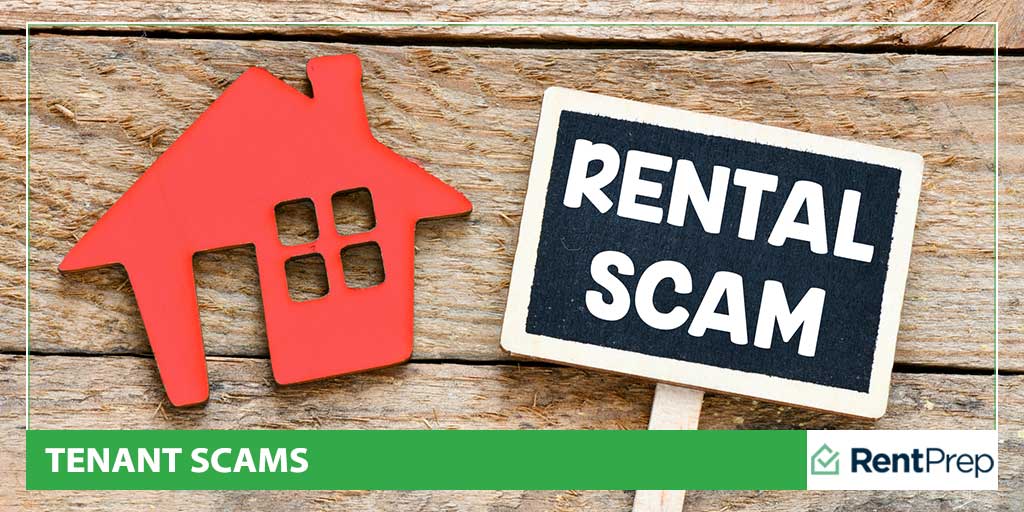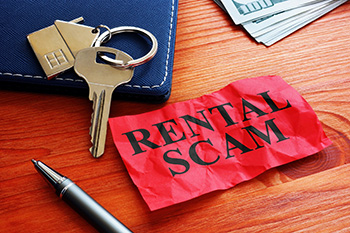
Most people think of shady landlord tactics whenever they hear the phrase “rental scams.” However, there are many different tenant scams that individuals try to use on landlords in order to live in a property for free, steal money, or otherwise take advantage of a landlord’s business.
What do you know about rental scams targeting landlords? If you don’t know about common renter scam tactics, you might not be able to protect yourself from becoming a victim of these circumstances. Lost money and risks to your investments can happen if you aren’t paying attention to the correct red flags.
The only way to be sure that you are protecting yourself as much as possible is by learning about the scams and what to look out for.
Today, we’re here to help. RentPrep’s complete guide to common rental scams that target landlords will help you find the security needed to reduce the risk.
A Table Of Contents On Tenant Scams
Common rental scams rely on uninformed landlords falling prey to the same tactics repeatedly. Follow along with our outline in today’s article to learn about rental scams targeting landlords and how to reduce the risk of being trapped in one.
- What Are Rental Scams?
- Rental Scams Targeting Landlords: All About Tenant Scams
- Identifying Tenant Fraudsters Before Renter Scam
- FAQs On Avoiding Tenant Scams
- Don’t Get Scammed: Stay Vigilant
What Are Rental Scams?

Rental scams occur when an individual pretends to rent out a property to someone to steal money from them or when a tenant scams a potential landlord for their own benefit. Rental scams can hurt both tenants and landlords, though the way these scams occur differs depending on the target.
Rental scam artists are usually trying to make a quick buck when scamming tenants. They collect application fees or deposits and then disappear. Tenant scammers are typically trying to live rent-free, but they sometimes will try to steal appliances or money from a landlord.
Rental Scams Targeting Landlords: All About Tenant Scams
Learning more about the rental scams targeting landlords like you will help prevent you from falling prey to these tactics. These are the most common tenant scams that target landlords.
Scam #1: Sending Too Much Money
In this scam, a tenant says that they, a friend, or an employer sent a check. The check is written for more than it should be, and the tenant suggests that the landlord simply refund the difference. In reality, the check is not real, and the landlord will lose money if they pay the difference.
Checks should never be cashed or accepted if they are not written for the right amount. Always return this type of check and provide receipts when possible. If you are receiving a larger check, document why to prevent this issue.
Scam #2: Faking Employment And Rental History
Applicants can write anything on their rental application, meaning they can lie. They will sometimes lie to hide a rough credit history or string of evictions. Ensuring the tenant has provided real, accurate information is necessary. Confirm your screening process is set up to watch out for falsified information.
Scam #3: Faking Credit History
These days, it’s relatively easy for tenants to get a copy of their credit checks. Some applicants will even suggest providing a copy of this report rather than paying another application fee. However, you should avoid this.
Scammers will utilize this tactic to present a false report that hides their true identity or financial troubles.
Tenants genuinely interested in the property will understand the need for your own tenant screening process to be completed. Those who push back are unlikely to be a good fit as tenants, even if they are not scammers.
Scam #4: Swapping To Sublease
Scammers may rent out your property only to illegally rent it out to someone else. Subleasing is not illegal in and of itself, but it is illegal if forbidden in the lease agreement or not disclosed to the landlord. Make sure your lease agreement specifies your terms regarding subletting, to ensure you can pursue eviction and restorative compensation if you end up in this scam.
Identifying Tenant Fraudsters Before Renter Scam
#1: Watch Out For The Bait & Switch
Don’t let yourself fall for a bait and switch. Ensure the applicant views the property themselves or find out why someone else is there instead. If more than one individual comes to the viewing but only one is renting the unit, make sure to inquire about subleasing to find out what the situation will be.
By asking these questions, you will gauge if the potential tenant is worried or relaxed, which can be very telling.
#2: Consistently Verify Information

Always verify documents and information given to you by tenants. Even if you like and trust the tenant at the first meeting, you never know what is going on. Make it part of your policy to always review tenant applications in thorough detail.
Follow up on all employment records, housing records, and documentation. Ensure the businesses listed are accurate and that the applicant is employed there. Find out if the address history is accurate through a background check, and contact previous landlords.
By consistently doing this with all prospective tenants, you’ll become familiar with the process and be more likely to notice when something sticks out as incorrect or falsified.
#3: Ask Reasonable Questions
While working with a potential tenant, ask questions about their employment, their reason for moving, and more. Don’t be too forceful with this, and don’t ask about any protected class topics. Instead, ask the same question in an easy, light way.
Be sure that you remember their answers, and see if they give the same answers each time. This simple attention to detail can help you spot scammers before catching you off guard.
#4: Don’t Rush Things
No matter how much an applicant tries to push you through the process, don’t commit to a lease agreement or tenancy without going through your usual screening process. Scammers often use fake urgency to get landlords to sign leases before any tenant screening is completed.
If a potential tenant brings up this idea one time, it’s probably not a big deal. If they continue to push back or act forcefully about their need for fast housing, it’s time to consider why they are doing this.
Some individuals might genuinely be desperate for housing, but even these individuals would understand the need for screening to be completed first. Be cautious of what tales are being spun, and make sure you don’t give up your security because of forced sympathy.
#5: Do Your Own Credit Check With RentPrep
In addition to doing your own credit check, you must look into tenant applicants’ backgrounds as much as possible to ensure you are choosing legit tenants. Tenants who are serious applicants will have no problem agreeing to this type of check, and it is standard in the business to do so.
Legitimate tenants with bad credit history or blips on their employment records will be upfront about this information so that you are not shocked by what you find. However, scammers disguising themselves as applicants will resist being screened at all. It’s easy to tell the difference when push comes to shove.
Doing a credit check using a high-quality tenant screening service like RentPrep will ensure that you get all of the information you need. Screen tenants with great accuracy and thorough details using RentPrep’s tenant screening packages.
FAQs On Avoiding Tenant Scams
What types of rental scams are out there?
Rental scams can affect both landlords and tenants:
- Vacant property scam: collecting application fees repeatedly without ever renting out the property
- Fake listings: collecting fees and deposits on units that do not exist or are not for rent; often done using photos from homes previously for sale
- Switching the lease: tenants are signed onto a lease for a different property than they are shown
- Leased: scammer collects rent or application fees on units already rented out
- Missing amenities: scammer has tenant sign lease without them noticing that advertised amenities are missing
These are just a few types of rental scams—here are hundreds of ways scammers try to take advantage of others. Often, however, they are unsuccessful thanks to vigilant landlords, tenants, and community members.
What are the most common rental scams?
There are many different types of housing scams that happen across the country. The most common of these scams affect tenants: fake landlords, fake photos, and rent collection issues abound. Tenants are warned to verify they are doing business with reliable characters and be wary of how they send rent to avoid having money stolen.
Landlords face issues with fake names, fake documents, and overpayments. These issues leave the landlord open to lease agreements with scammers or with complicated financial ties to resolve without losing money.
How do I make sure my renter is legit?
Determining whether or not a renter is legit is difficult at times and can feel intrusive, but it’s a necessary step if you want to keep your investments safe. Ideally, you will be able to avoid rental scams and keep fraudsters away by doing the following while screening tenants:
- Request proof of employment
- Verify and review any pay stubs or offer letters for validity
- Run a thorough background check
- Cross-check employment history with the rental application
- Verify employment by calling the company
- Utilize a professional screening company when possible
Taking time to do a detailed review of all information provided to you will reduce the chances of you working with a scammer. Scammers usually avoid landlords who pay attention to details as it is harder for them to commit their crimes with this type of oversight. By simply being attentive, you can protect your business.
Can I report a scammer to the police?
If a fraudulent tenant ever scams you, you may want to report them to the police. Depending on the exact type of scam, this might be possible.
Call the police as soon as possible to ensure that you have a chance to report the scammer. They can advise about whether or not to file a report. Tell them what happened and give as much information as possible about what was stolen or taken, who was involved, and what evidence you have.
If a tenancy were in place, another way to get money back would be to pursue the scammer in small claims court with your lease agreement. However, scammers who lie about their names on the documentation may be hard to track down.
Do your best to report the incident to all relevant agencies as soon as possible. Some may have fraud protection in place and be able to help you control the incident as quickly as possible.
How can you identify a rental scammer?
In addition to learning more about potential tenant scams, the best thing you can do to identify rental scammers is cross-check all of their information.
Go through rental applications carefully. Ensure everything is validated correctly; don’t assume the statement is true. Most people are truthful when submitting applications, but scammers are not. Avoiding scammers is possible if you check into this information.
If this is difficult to do on your own, it’s worth the investment to use a high-quality tenant screening service to ensure you are checking information for accuracy.
Don’t Get Scammed: Stay Vigilant
Be vigilant with every single potential tenant. Even those who seem kind and harmless could be fraudulent scammers. It’s hard not to seem pessimistic when sharing this information, but the simple fact is that landlords are running a business they need to protect.
By ensuring that you carefully screen and review every application that comes in and all payments, you are protecting the future of your investment. Skipping any of the following can lead to significant scams that you want to avoid:
- Conduct your own credit and background check.
- Do not accept checks for more than what is owed without clear contracts in place.
- Review and validate all proof of employment, income, and rental history.
- Do thorough tenant screening with a high-quality service if you need additional support.
These tactics help catch red flags that may alert you to fraudulent tenants who are just trying to steal from you and get a few free months of accommodations. Don’t let the obvious slip by—stay aware of rental scams that target landlords like you.

